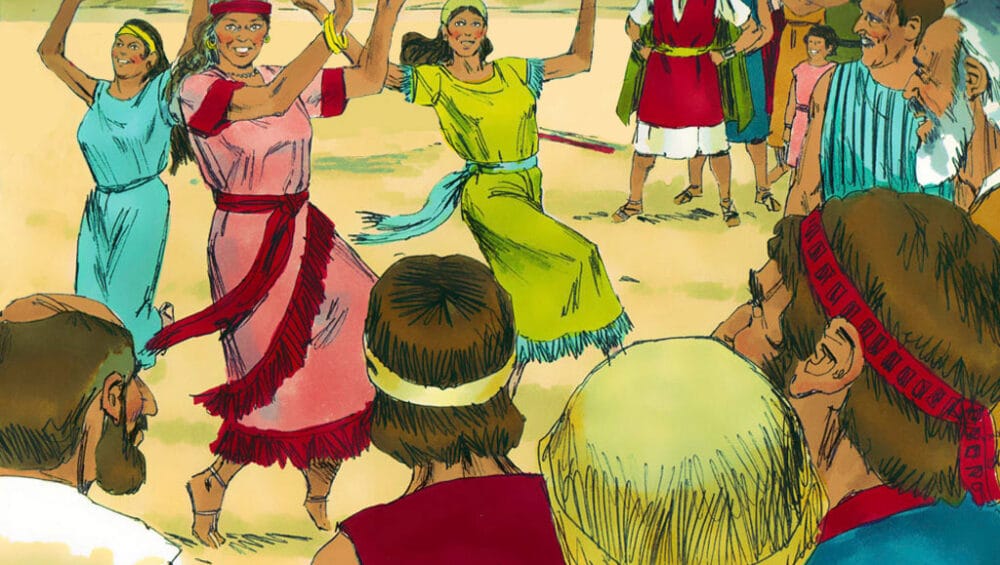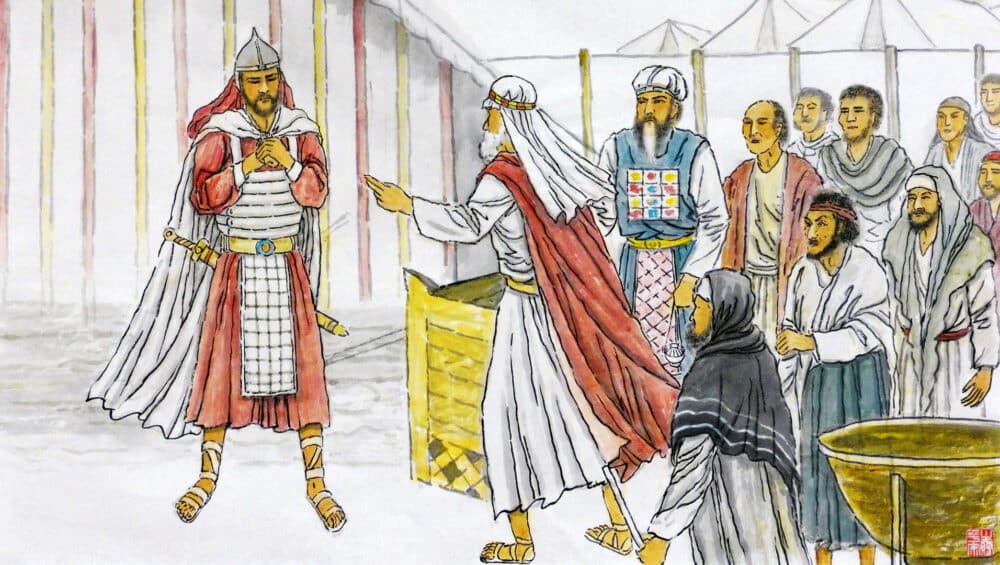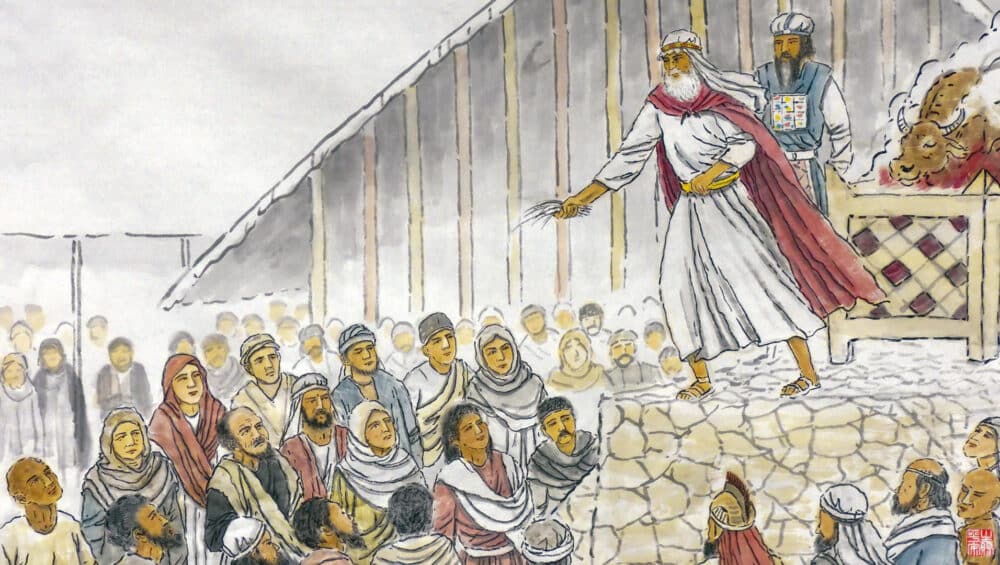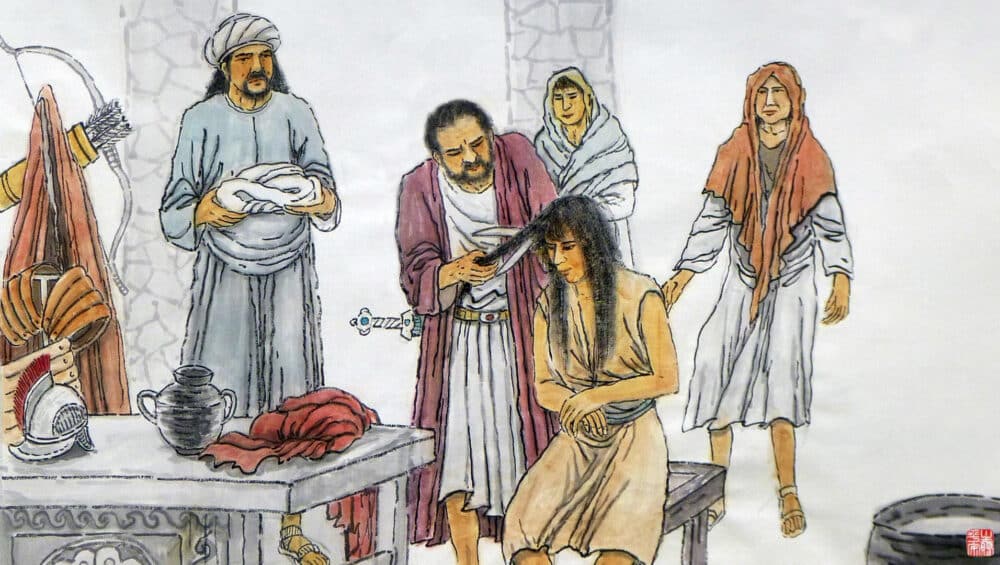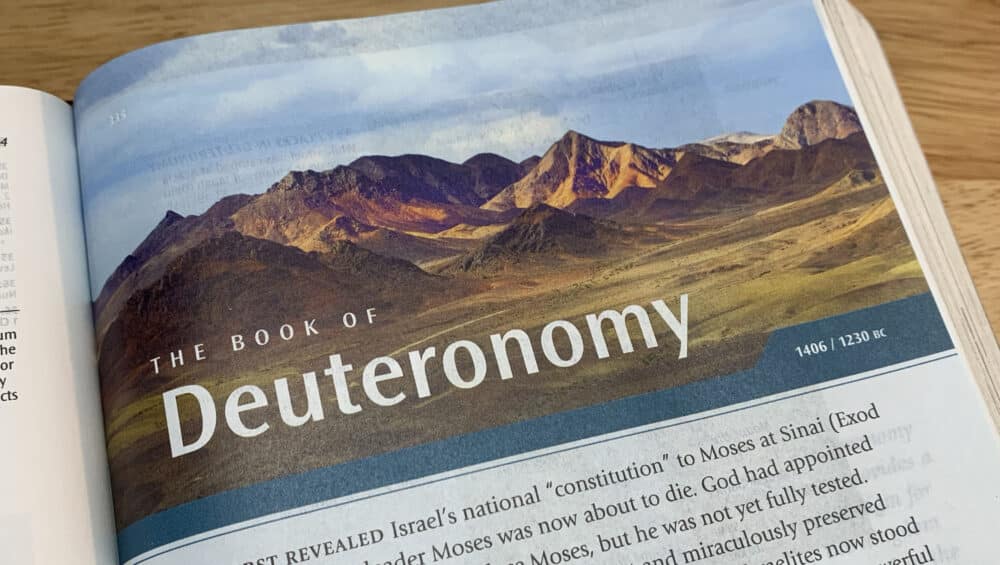Credit: Sweet Publishing / FreeBibleimages.org
Welcome to Livin’ Light’s Bible-In-A-Year challenge of discovering God’s love for us and His purpose for our lives. Here is the format for this great adventure: The daily reading assignment is posted at 5 a.m. After each day’s reading, Leigh An Coplin, the blog host, shares observations and poses questions about difficult passages to Rob Fields, who studied Christian Education at Asbury Seminary and currently teaches Biology in the Orlando area. To start from the beginning, click on 365 Bible Readings and scroll down to Day 1. The reading schedule is taken from The One Year Chronological Bible NLT.
Today’s Reading
— Deuteronomy 31:30-32:52
— Psalm 90
(1406 BC) Click here for a timeline of the entire Bible.
Questions & Observations
O. Before I read today’s readings, I was thinking about Moses’ relationship with God. Thus far, he has been the closest human to God, so we should focus on what he is about to say and know that the words are coming from a man who has spent many days with God and had God’s glory in him.
Q. (32:8): Can you explain this verse? I’m at a loss. When it says “divided up the human race” is he talking about the tribes being assigned land? And what is the heavenly court? From my footnotes, it looks like it could have several meanings? The Dead Sea Scrolls, the Greek version and the Masoretic Text all say something different.
A. Nice job incorporating our material from yesterday! I don’t have a clear explanation for the verse. The dividing up the human race appears to be a reference to the Tower of Babel and the distribution of the nations after its fall from Genesis 11. The heavenly court is usually viewed as the congregation of the angels, as we saw in the beginning of Job. There are some Jewish traditions that ascribe to a notion that angels had a territory among the different nations, so the reference to division based upon the court might refer to that. But, I can’t say it definitively.
Q. (32:10): What does the second part of the verse mean where he says he guarded them as he would guard his own eyes?
A. You guard your eyes like no other part of your body. Even as a reflex (blinking, pulling away, etc.) your body automatically will take great steps to ensure that your eyes are not damaged. They are so important. God is watching over Israel just as closely, it says, as how carefully you guard your own eyes.
Q. (32:15): Moses refers to God as a Rock here. I’m sure there is a good meaning behind the name.
A. Even today, we think of rocks as being steady and unbreakable. That’s a central part of the image. Also, in this era, rock faces and caves would have served as shelters for people who desired to hide, so we can also think of rocks as a source of protection. So God as the Rock paints an image of protection, steadiness, and longevity.
O. (32:39): A verse worth noting. It brings up a question we have had before about if there are other gods. “Look now: I myself am he! There is no other God but me! I am the one who kills and gives life; I am the one who wounds and heals; no one can be rescued from my powerful hand.”
Q. (32:40-41): Is Moses talking for God here or himself? I don’t know what Moses means when he says, “As surely as I live, when I sharpen my flashing sword and begin to carry out justice, I will take revenge on my enemies and repay those who reject me.”
A. Moses is talking for God here. This imagery refers to God avenging Himself among those who reject Him, referring specifically to the many Israelites who will be unfaithful to Him. We will see various instances of this in future readings (I’m thinking of Joel 2 in particular, which is a powerful image of God avenging Himself), so let’s see how this verse is seen in subsequent stories.
Q. (32:50): What is the significance of both Moses and Aaron dying on a mountain?
A. Mountains are associated with the presence of God (like Mt. Sinai/Horeb), so dying on a mountain would be associated with the path a person “walks” to join God on high. It is symbolic of a life journey where the end destination is God.
Q. (Psalm 90:4): Can this verse be used as proof of creation? The 7 days of creation may have been longer. I know it’s not important how long it took God to create the world. I just thought it may be used to explain that. Or, was Moses just making a quip?
A. You have touched upon something that is common in some circles: to use this verse and other citations of it to say that Creations could have been longer than one 24-hour period. I don’t put much stock in these. Moses is using metaphorical language to say that our concept of time means nothing to God. I wouldn’t take it to mean anything more literal than that.
Q. (Psalm 90:5-9): This doesn’t paint a pretty picture of a reverent relationship with God.
A. In light of the eternal nature of God, I can’t say that I disagree with the assessment. Next to Him, everything seems finite and fading. It is only by His mercy that we are able to be more than dust in the wind, as it were.
Q. (Psalm 90:12): This verse says a lot! I often think of troubles I have or things I want to do but can’t, for reasons of time and money. And, if I’m in my right mind — which isn’t often enough — I remember that our time on Earth is so short and that if I don’t get the things done on my bucket list, then it’s no big deal. God has bigger and better things for me waiting in heaven. And I also think that my future in heaven, and possibly other’s futures, relies on what I do right now on Earth. That gives me perspective to keep on seeking God’s guidance and do what He wants me to do. This does sound a little dogmatic and I don’t mean it to. I truly believe that He has given me, and anyone else who cares to listen to Him, a curriculum for my time on Earth. And, from that, I gain the wisdom to make the right choices and not waste my time on empty matters. Did I apply this correctly, Rob?
A. If we have properly fixed our gaze and decisions on the eternity of God, and not our time on earth, then I think that we are able to make decisions that allow us to live in light of this eternity. You’ve got the idea.
Thanks for reading along. See you tomorrow!
Further reading:
— Seven things to know about the Song of Moses, https://www.biblestudytools.com/bible-study/topical-studies/inspiring-things-to-know-about-the-song-of-moses.html
— A deeper look into the Song of Moses, https://en.wikipedia.org/wiki/Song_of_Moses
Tomorrow’s reading: Deuteronomy 33-34, Joshua 1-2

